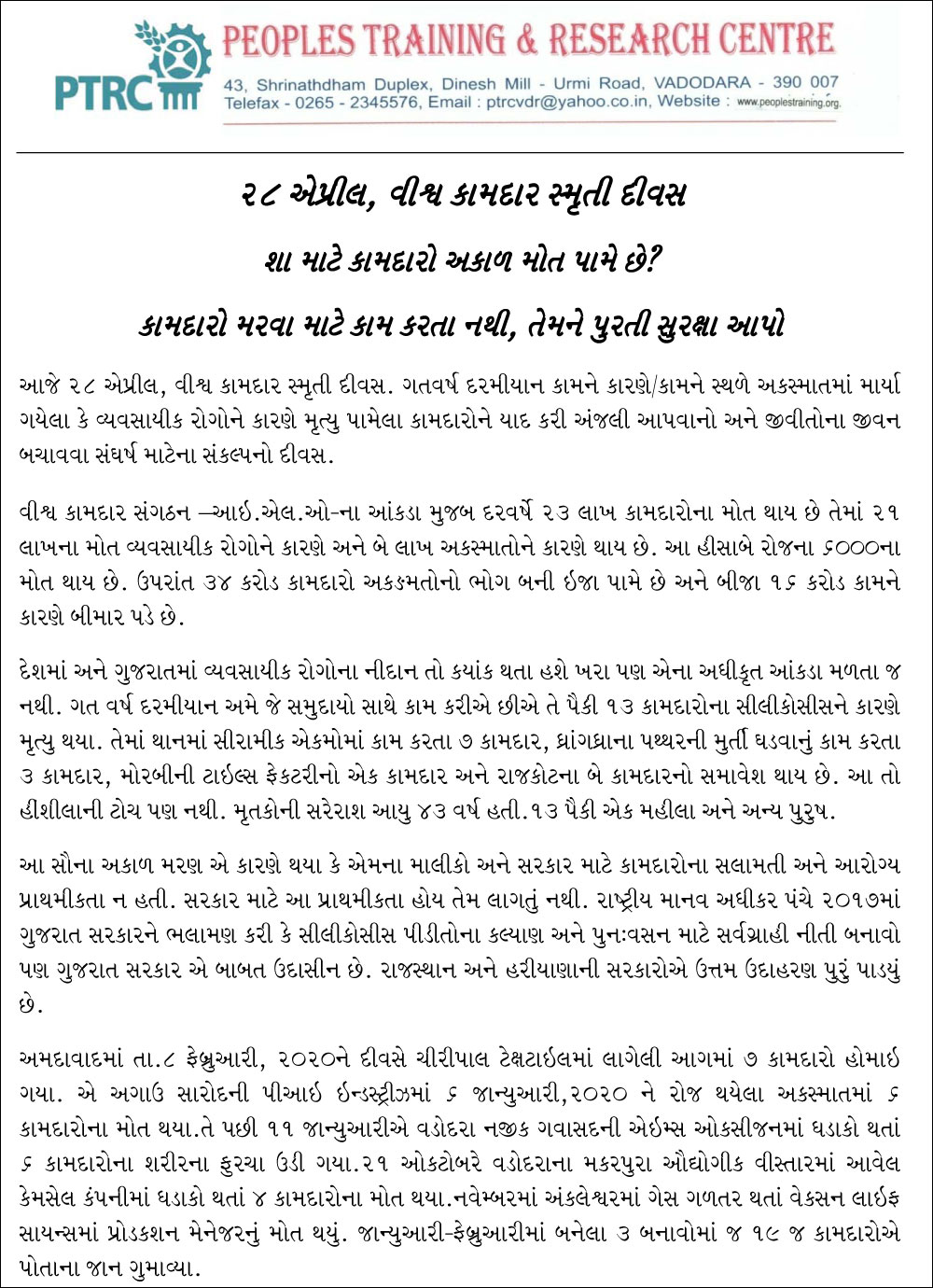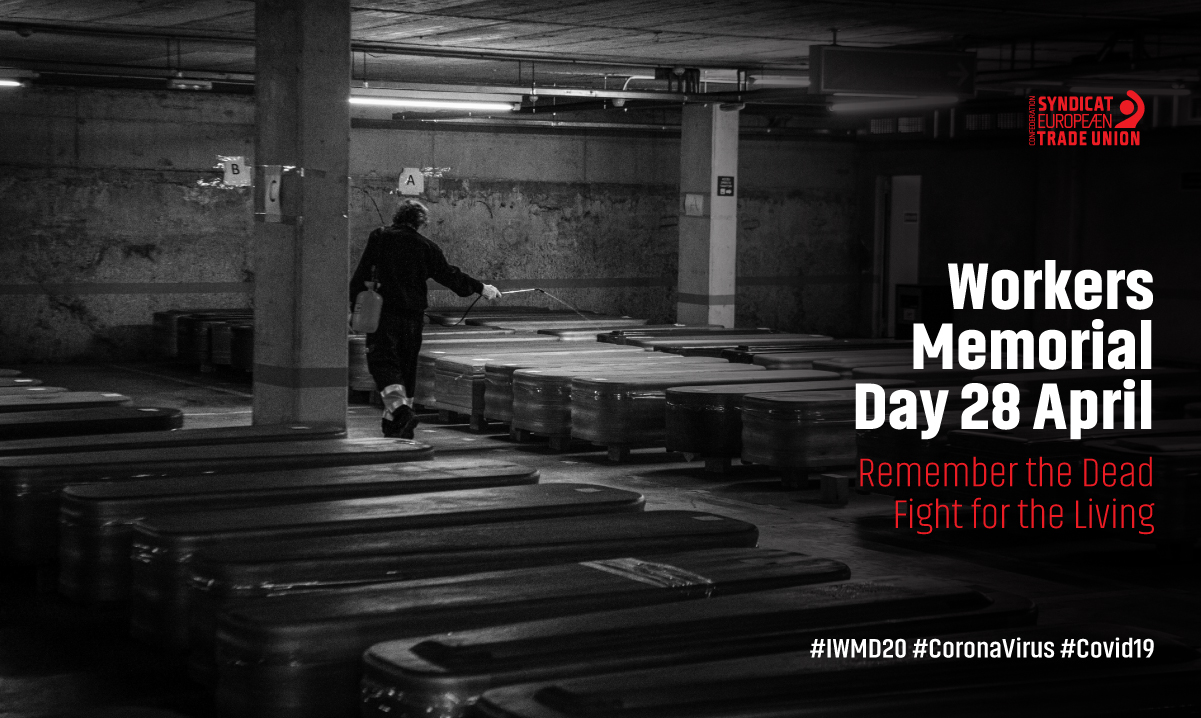Read the statement from PTRC, Gujarat, for 28 April
28 April, International Workers Memorial Day
Why do workers meet premature death?
Workers don’t work to die, provide them adequate protection.
Today is 28 April, IWMD. We remember those who died during the year in accidents at work or of occupational diseases and dedicate ourselves to fight for the living.
As per ILO estimates 2.3 million workers die each year in which 2.1 million die of different occupational disease and 0.2 in accidents at work. It amounts to 6000 deaths each day. Another 340 million injure themselves in accidents and 160 million get sick due to work.
We do not have official data of occupational diseases either for the country or for the state of Gujarat, though diagnosis of ODs might be done here and there. During the last year 13 workers died of silicosis from among those community with whom we work. That includes 7 from ceramic units in Than, 3 from sculptures in Dhrangadhra, 1 from tile factory in Morbi and 2 from Rajkot. Average age was 43. Among 13, one was female and rest male workers.
All these met with premature deaths because their health was not the priority for their owners or the Government. This does not seem to be priority of the Government of Gujarat either. In 2017 National Human Rights Commission recommended the State to formulate comprehensive policy for the rehabilitation and welfare of the workers suffering from Silicosis but State Government has not taken any action yet. Rajasthan and Haryana have set good example by formulating such policy for their states.
7 workers died in a fire in Chiripal Textile in Ahmedabad on 8 February, 2020. Before that 6 workers died in accident in P.I.Industires in Sarod on 6 January, 2020. Another 6 died in explosion in Aims Oxygen, Gavasad in Vadodara on 11 January, 2020. 4 workers died in Chemshell explosion in Makarpura industrial area in Vadodara on 21 October 2019. Production manager died in November ,19 in gas leak in Vakson life in Ankaleshwar. 19 worker died in 3 incidents took place during January-February of this year.
Most accidents that take place in factories are preventable. Factory Act provides elaborate provisions to prevent accidents. If enforced, that will help reduce accidents. But looking at the above data it can be seen that the fatal accidents are on increase. Impact of failure of employers and Governments in providing safer and healthier workplace fall not only on the families of the individual workers but also deeply on the economy of the country. Productivity goes down. At present many sanctioned posts of inspectors in labour department are lying vacant. It is the responsibility of the State to fill up the vacant positions. On the other hand, under “ease of doing business” policy for inspection has been changed. In violation of the Contract Labour (Abolition and Regulation) Act workers are appointed through contractors in manufacturing and there is no control over their working hours. State has stopped filing complaints for violation of provisions for working hours in the Act since last so many years. By amending the provisions limit of overtime hours has been raised. Enforcement of provision to file return in Form 24 under Sec.107 of the Gujarat Factory Rules is so weak that we do not get correct data. Consistent decrease in Notifiable accidents seen in official data is nothing but under reporting. As the industry is interested in posing their better image unfortunately, State, too is interested. Well, we can understand this interest but it is no good to use half truths to build image.
Record of the State in fatal accidents is no good. To keep the data on lower side they play tricks like legal and non-legal still according to the data published by National Crime Records Bureau for the fatal accidents in 2016, Gujarat stood second after Delhi. From 2013 to 2018 989 workers died in fatal accidents in Gujarat. In 2018 218 workers died till November and for the same period in 2019, 168 workers died.. In 2018 there were 32192 working and registered units in the State which employed 1.725 million workers. 263 workers died in that year as per official data. This amounts to rate of 15.23 per 100,000 workers employed. In 2017 this rate for European Union was 1.65 (https://ec.europa.eu/eurostat/statistics‐explained/index.php/Accidents_at_work_statistics). Comparing this rate with that of Gujarat indicate, we have a long way to go in providing safer workplace to our workers.
It is observed that the complaints filed by the State for the violation of provisions of Factory Act are under Sec. 92 only but no complaints are filed under Sec.96-A. After Bhopal gas tragedy the Act was amended to make more stringent provisions for violations but State is not taking any advantage of this amendment and that is how industry is not only shown leniency but they are encouraged to violate the provisions.
In factories workers come in contact with the materials they handle which adversely affect their health and thousands suffer from cancer, lung diseases, skin diseases, noise induced deafness and so on. But we do not have reliable data on these. With great pain we have to take note that the Certifying Surgeons and Factory Medical Officers have utterly failed. The private practitioners who diagnose these diseases do not notify them either because many of them do not know the provisions and State is not interested.
As per the report of Comptroller and Auditor General (CAG) it is the policy of the State to not to take any legal action against the violator for fatal accident if the employer pays ex-gratia compensation (over and above the legal compensation) to the victim and if they don’t pay ex-gratia amount, take action up to closer. It is complete illegal not to file complaint though the unit has violated the law. It is unacceptable to allow manufacturing by keeping worker’s life at bay. Life of any worker is invaluable but State is not interested in saving their life. Please the victim family by paying little more to keep them shut. Workers don’t come to factory to die. This policy is cruel joke of human dignity and human rights. We condemn this policy and in wider interests of the workers demand-
- There is urgent need to protect health care workers engaged in COVID-19. To monitor health care services provided by private sector Central Government enacted Clinical Establishment Act, 2010 should be accepted by the State. 11 states have already implemented it, why not Gujarat?
- Fame comprehensive policy for rehabilitation and welfare of silicosis patients as recommended by National Human Rights Commission in 2017.
- Sanction posts of inspectors as per ILO standards for the registered factories under Factory Act. Numbers should be reviewed each year.
- Fill up vacant posts of inspectors. Provide them adequate training.
- Improve the quality of the working of the inspectors by providing them training and monitoring their work. Arrange online system to control corruption. As per news reports State has come up with mobile apps called “SACHET” and “SIMPLE.” We welcome this action and hope that it will help better monitoring.
- File complaints for the violation of the provisions of the Act. Allocate adequate number of legal officers in the department. Justice system should be such that long time is not wasted in getting justice. Do not transfer complaints of fatal accidents in Lok Adalat. It should be remembered that the complaints filed under Factory Act are of criminal nature and its seriousness should be understood. Review them regularly. File complaints under Sec.96-A.
- Give prosecution powers under Factory Act to the workers, labour NGOs and trade unions. Partner with workers, trade unions and labour NGOs in enforcement.
- Organize programs for awareness and popularize provision of notification of occupational diseases among the public and private medical practitioners.
- Provide legal protection to the Factory Medical officers and monitor their work.
- Publish all the data, annual reports, inquiry reports, court orders, circulars and other material for the people to access online.
- State is empowered to amend the list of Sch.III of the the Employees Compensation Act. Amend the list to include Musculoskeletal diseases and diseases caused by Polyacrylate.
- Appoint qualified industrial hygienists in Ind. Hygiene Laboratory, provide them equipment and give them powers.
- Give powers to notify the accidents and occupational diseases to the workers, trade unions and labour NGOs.
PTRC Contact: Jagdish Patel • Website
Plus: Read the news story 13 workers died of silicosis in Gujarat in 16 months


